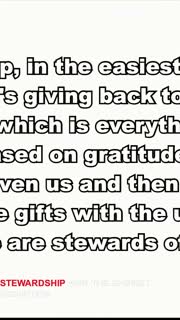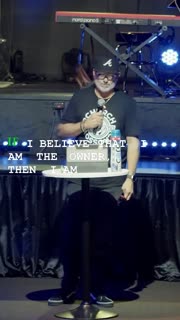Embracing Stewardship: Trusting God's Ownership in Our Lives
Devotional
Sermon Summary
Bible Study Guide
Sermon Clips
### Quotes for Outreach
1. "Today for you and I, everything changes. Do you believe that? There's nothing too big. Nothing. The truth is God owns everything. He owns that lady's car and the one she mistakenly got into. And he owns everything that Eric calls his, everything that we call ours, mine, with a death grip. That's mine. He owns it all." [04:00] (60 seconds)
2. "Stewardship and the easiest definition is gift of self of you and I it's giving back to God what he gave us, which is everything. It's a lifestyle based on gratitude for all that God has given us and and and then generously sharing those gifts with the understanding that we are only stewards. Of these. So in other words, stewardship is how we use our God. Given gifts." [09:41] (29 seconds)
3. "He doesn't ask you for things you don't have. He asks you for the things that are his. The thing that sometimes that he asks is we believe that we own it. So we don't know how to partition that. So what Eric does is become the steward and I get lost and befuddled in the middle. Of that so conflict comes up in my life and it's really not about the home. It's really not about work and my boss and we'll talk about that in the point number two." [07:02] (28 seconds)
4. "He doesn't need your money. He doesn't need your time. He doesn't need your talents. He just wants you. He wanted me. He's such a good God. And I worship him today. he didn't ask for it at all. He just said trust me in that." [42:54] (35 seconds)
5. "Do you ever feel hungry that you're missing something? Do you ever feel like you're missing out on the presence of God? Because I felt it when I watched it online, rebooting 33 servers and doing upgrades and trying to get around the Christ, the crowd strike issue that happened in cyber security. And by the way, that wasn't a cyber security attack. That was an upgrade that went bad." [18:43] (17 seconds)
### Quotes for Members
1. "If I believe that I am the owner, then I am constantly. Going to be in conflict with God over what I do with the things that Eric has. Have you ever experienced conflict in your life? It's the point in the middle of two composing issues, two contradicting circumstances. And it brings conflict that is measured in an innumerable sense. It's way beyond our fathom. I mean, because we really can't understand it." [05:43] (32 seconds)
2. "Stewardship is how we use our God giving gifts. It's how we use our time, our talents and our treasure to carry on Christ's work of reconciliation in this dead, broken and dying world. Here is a way to look at these aspects of stewardship. You're ready. Are you ready? Number one. Here we go. The gift of time. None of us has enough of it. All of us want more." [10:55] (30 seconds)
3. "Jesus did not die to make you and I safe. He died to make us dangerous. And when we begin to understand that you and I are not on defense and we are on offense, our time begins to change. Can I get an amen? We begin to hear the ticking of the seconds in the moment of time begin to go between time and space continuum. And we begin to see a dawn of a day. That's coming ever closer." [20:48] (23 seconds)
4. "He knows you by heart. He knows you by name. And he wants to escalate the things that you may be looking at as a disadvantage. Paul told Timothy to fan in the flames those giftings. Don't let them despise you because you're youthfulness. Don't let them despise you youth because you're young. Timothy was leading the church at Ephesus. And Paul was longing to get back there. And Timothy was bossing up." [26:17] (29 seconds)
5. "We see here in James that Jesus's half brother had it right. And yes, by the way, this was Jesus's half brother, and maybe he knew that Jesus had more he did in his life than just three to three and a half years. And I know scripture doesn't unfold that. But there were people who had and saw the inner workings of baby Jesus. That was not listening and being about his father. Business getting lost at the temple and wanted to be at service every day." [19:47] (27 seconds)
Ask a question about this sermon
1. "Today for you and I, everything changes. Do you believe that? There's nothing too big. Nothing. The truth is God owns everything. He owns that lady's car and the one she mistakenly got into. And he owns everything that Eric calls his, everything that we call ours, mine, with a death grip. That's mine. He owns it all." [04:00] (60 seconds)
2. "Stewardship and the easiest definition is gift of self of you and I it's giving back to God what he gave us, which is everything. It's a lifestyle based on gratitude for all that God has given us and and and then generously sharing those gifts with the understanding that we are only stewards. Of these. So in other words, stewardship is how we use our God. Given gifts." [09:41] (29 seconds)
3. "He doesn't ask you for things you don't have. He asks you for the things that are his. The thing that sometimes that he asks is we believe that we own it. So we don't know how to partition that. So what Eric does is become the steward and I get lost and befuddled in the middle. Of that so conflict comes up in my life and it's really not about the home. It's really not about work and my boss and we'll talk about that in the point number two." [07:02] (28 seconds)
4. "He doesn't need your money. He doesn't need your time. He doesn't need your talents. He just wants you. He wanted me. He's such a good God. And I worship him today. he didn't ask for it at all. He just said trust me in that." [42:54] (35 seconds)
5. "Do you ever feel hungry that you're missing something? Do you ever feel like you're missing out on the presence of God? Because I felt it when I watched it online, rebooting 33 servers and doing upgrades and trying to get around the Christ, the crowd strike issue that happened in cyber security. And by the way, that wasn't a cyber security attack. That was an upgrade that went bad." [18:43] (17 seconds)
### Quotes for Members
1. "If I believe that I am the owner, then I am constantly. Going to be in conflict with God over what I do with the things that Eric has. Have you ever experienced conflict in your life? It's the point in the middle of two composing issues, two contradicting circumstances. And it brings conflict that is measured in an innumerable sense. It's way beyond our fathom. I mean, because we really can't understand it." [05:43] (32 seconds)
2. "Stewardship is how we use our God giving gifts. It's how we use our time, our talents and our treasure to carry on Christ's work of reconciliation in this dead, broken and dying world. Here is a way to look at these aspects of stewardship. You're ready. Are you ready? Number one. Here we go. The gift of time. None of us has enough of it. All of us want more." [10:55] (30 seconds)
3. "Jesus did not die to make you and I safe. He died to make us dangerous. And when we begin to understand that you and I are not on defense and we are on offense, our time begins to change. Can I get an amen? We begin to hear the ticking of the seconds in the moment of time begin to go between time and space continuum. And we begin to see a dawn of a day. That's coming ever closer." [20:48] (23 seconds)
4. "He knows you by heart. He knows you by name. And he wants to escalate the things that you may be looking at as a disadvantage. Paul told Timothy to fan in the flames those giftings. Don't let them despise you because you're youthfulness. Don't let them despise you youth because you're young. Timothy was leading the church at Ephesus. And Paul was longing to get back there. And Timothy was bossing up." [26:17] (29 seconds)
5. "We see here in James that Jesus's half brother had it right. And yes, by the way, this was Jesus's half brother, and maybe he knew that Jesus had more he did in his life than just three to three and a half years. And I know scripture doesn't unfold that. But there were people who had and saw the inner workings of baby Jesus. That was not listening and being about his father. Business getting lost at the temple and wanted to be at service every day." [19:47] (27 seconds)










